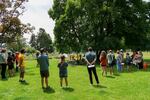In the late 19th and early 20th century, the bodies of Chinese workers who built the city’s infrastructure were interred at “Block 14” in the Lone Fir Cemetery, along with those of asylum patients from the Oregon Hospital for the Insane. There are no grave markers for those buried at “Block 14”, though signage at the cemetery and online provides information about the area’s history. Some of the remains of those interred were sent to China to family members, but some intact burials still remain.
According to property-owner Metro, work is underway to create a cultural heritage garden at Block 14.
This lesson is one part of Oregon’s history that teacher Ursula Wolfe-Rocca hopes will be taught in K-12 history classes around the state. The mini-history lesson was one of four shared by Portland-area educators Saturday at events around the city.
At Colonel Summers Park, a block away from Lone Fir, about 30 educators and others gathered to learn about “Block 14″, and show support. Grant High School teacher Suzanna Kassouf read “Flowers for Block 14,” a piece written by Holly Hisamoto.
This open field is neglected because these were the bodies of non-White people. . . .
These were the bodies of traumatized people, mentally and emotionally suffering people, marginalized people, exploited workers, people the city had forgotten. . . .
Attendees at the park signed postcards pledging to “teach the truth.”

Saturday's event at Colonel Summers Park in Southeast Portland was part of a national "Day of Action" to support teaching history and speak out against legislation that limits teaching about racism and related topics.
Elizabeth Miller
At an event earlier in the day, Abernethy elementary teacher David Scholten said about 60 people gathered at Friendship Circle in the Japanese American Historical Plaza, with teachers and students speaking, and connecting “current issues” with the past.
“The truth is that racism played an undeniable role in this country’s history — and the State of Oregon is no exception,” said Alicen Gaitanis, a teacher at Rock Creek Middle School in Happy Valley in a release for the event.
“If you can’t teach that, you can’t teach the truth.”
Other events focused on the Vanport community and the flood that destroyed it, the history of Japanese-Americans on the west coast, and the history of the Holocaust.
“No one teacher would teach all four of these things in the same year,” Wolfe-Rocca said. “But I think a full and robust accounting of Oregon’s history, and in the context of U.S. history … should definitely touch on all four of the topics.”
Until last year, Wolfe-Rocca taught high school social studies in the Lake Oswego school district. She also works for the Zinn Education Project and Rethinking Schools Magazine.
Portland’s action Saturday was one of several planned throughout the country, a “Day of Action” campaign to speak out against legislation aimed at restricting curriculum related to racism and history.
“We want to stand in solidarity with folks on the ground in those states who are having to combat those bills,” Wolfe-Rocca said.
According to Chalkbeat, there are at least 21 efforts to “restrict education on racism, bias, the contributions of specific racial or ethnic groups to U.S. history, or related topics”. Chalkbeat has also tracked nine contrasting bills to “expand” education on these topics, including in neighboring Washington and California.
Locally, there is no planned legislation to restrict these types of lessons. In fact, there was a public hearing in March for SB 683, a bill introduced this session that would require “school districts to provide instruction on racist history of this country and state,” but there has been no further legislative action on that bill. Work on the state’s new ethnic studies standards, the result of a bill passed in 2017, is ongoing.
But recently, some Oregon school districts and educators, specifically in the Portland area, have been mentioned and targeted in national media for teaching about subjects like climate change and racism.

At Colonel Summers Park in Southeast Portland, educators signed pledges to "teach the truth" and wrote messages of support to educators in other states facing education-restricting legislation.
Elizabeth Miller
A recent article targeted anti-racism efforts in Portland, Beaverton, and Tigard-Tualatin. Wolfe-Rocca said the article named one of her child’s teachers.
“Even in places where we do not have pending legislation … even in those places, the ideas are circulating, and the ideas themselves can result in some really dangerous situations for educators,” Wolfe-Rocca said.
At a recent school board meeting in Camas, parents spoke out about their issues with perceived curriculum, with one seeming to threaten to dox teachers. Critical race theory, an academic framework that has been around for decades, was mentioned by several parents, both in-person at the board meeting and through written public comment.
To those arguing teaching about racism is “divisive,” Scholten said that if we don’t acknowledge racism and learn about it, nothing will change.
“Teaching about racism in school is a way to heal the problems that we have,” he said.
Wolfe-Rocca said looking back on history gives important context to the state of things today, both as a teacher and as a parent.
“My kid looks around and sees tents all over this city, they see evidence of the racial wealth gap, and they want answers,” Wolfe-Rocca said.
“There is no ethical, responsible, accurate way to answer those questions for children without referring to our past, and referring to a true accounting of our past.”
